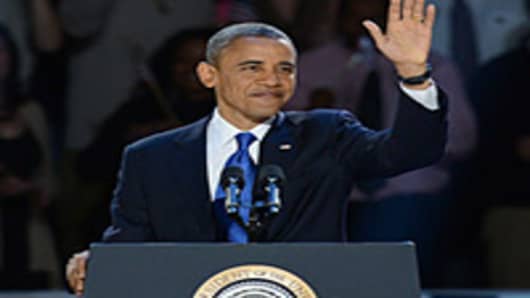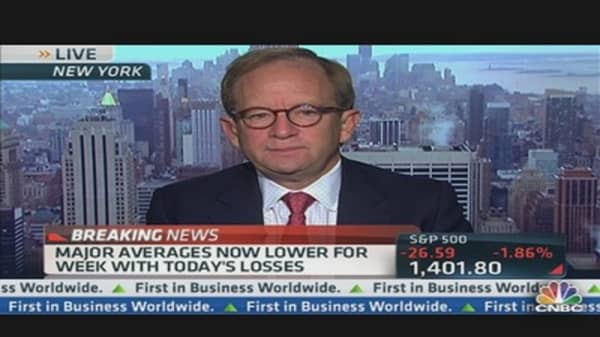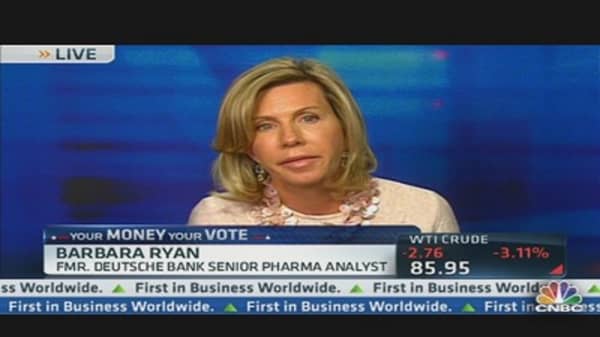Taxes
What was a contentious issue during the campaign will likely remain so. Obama said that higher taxes on the rich will not stifle economic growth and that both tax hikes and spending cuts are needed to achieve long-term deficit reduction. Whether he can get Republicans to agree to any tax hikes may be his greatest domestic challenge.
Obama also has said he would like to raise taxes on the wealthy and ensure they pay 30 percent of their income, which he says would help reduce the budget deficit. (Read More: What is the Deficit)
Obama said he supports extending Bush-era tax cuts for everyone making under $200,000, or $250,000 for couples. He had agreed in 2010 to a two-year extension of the lower rates for all taxpayers.
But that extension ends on Dec. 31, and Obama has said he would let the top two tax rates go back up 3 to 4 percentage points to 39.6 percent and 36 percent—and raise rates on capital gains and dividends for the wealthy.
A Treasury Department report says Obama's proposal to let the Bush tax cuts expire for top earners would hit only a tiny fraction of all small businesses—but it includes nearly 1 million companies.
Other taxes going up under Obama would be to help cover Medicare costs from the Affordable Health Care Law—with a tax on highest-value health insurance plans. (Read More: What is Medicare?)
Obama has said he would replace the Alternative Minimum Tax (AMT) with the "Buffett Rule," named after billionaire investor Warren Buffett. (Read More: What is the AMT?)
The AMT was originally designed to keep top wage earners from taking too many deductions, but it currently captures many middle-class families. The Buffett rule holds that millionaires shouldn't have a lower effective tax rate than anyone else—and that they should pay at least 30 percent of their income in federal taxes. (Read More: Warren Buffett Watch)
Obama would continue a 15 percent tax rate on dividends and capital gains for families making less than $250,000 a year.
When it comes to business, Obama would reduce the top corporate rate to 28 percent from 35 percent. Obama has also called for new tax codes to encourage investment at home and discourage the offshoring of jobs and factories.
As for the estate tax, Obama said he would reinstate the 2009-level rate of 45 percent after a $3.5 million exemption on assets passed to heirs.
Economy & Jobs
The current unemployment rate sits at around 7.9 percent. So, to get the economy moving — and to create jobs — Obama said on the campaign trail that he wanted Congress to pass his $447 million American Jobs Act that he initially proposed in 2011. It was defeated in the Senate. The key elements of the package reprise parts of Obama's 2009 stimulus measure and a Social Security payroll tax cut enacted in 2010.
The plan combines payroll tax cuts for workers and businesses with $175 billion in spending on roads, school repairs and other infrastructure, as well as unemployment assistance and help to local governments to avoid layoffs of teachers, firefighters and police.
The jobs measure would be paid for by a 5.6 percent surcharge on income exceeding $1 million, expected to raise more than $450 billion over a decade, according to the Obama campaign.
Obama has also proposed tax breaks for U.S. manufacturers producing domestically or repatriating jobs from abroad, and tax penalties for U.S. companies outsourcing jobs.
Federal Deficit
For the fourth-straight year the U.S. is projected to have trillion-dollar deficits. Obama has called for tackling the debt with a mix of spending cuts and revenue increases. Central to Obama's plan is to let Bush-era tax cuts expire for couples making more than $250,000. (Read More: What is National Debt?)






